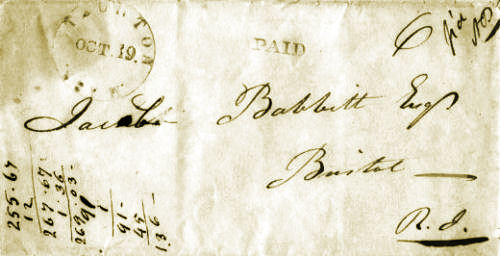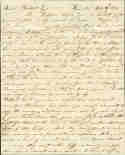![]()
Postal History Introduction
Stampless
Covers
1846
to 1900 Issues
1901-1950
Issues
1951-2003
Issues
Cancels
&
Miscellaneous
Postal
Stationery
Post
Cards
Air
Mail
First
Day &
Event Covers
Parcel Post/Special Delivery
Registered & Official Mail
Commercial & Advertising
Revenue & Postage Due
Wildlife & Game Issues
Complete List of RI Issues
|
Rhode Island Stampless
Covers & Letters |
||
|
||
|
The Stampless Folded Letter (SFL) above was sent to Jacob Babbitt, a rich Bristol merchant by Dr. Alfred Dayton in Taunton, Massachusetts on October 19, 1822. There is a black October 19 Taunton CDS at top left with a paid stamp, also in black and a script (rate) 6 at top right. The letter was charged at the single sheet rate of 6 cents for mail traveling a distance of less than 30 miles set by the Postal Act of April 9, 1816; effective May 1, 1816. (The distance between Taunton and Bristol is 18 miles.) Dr. Dayton is writing to Babbitt concerning the condition of his two sisters' home, which is in a state of very poor repair. He is asking Babbitt to provide repairs and also informs him of the sisters' poor health and lack of finances. It appears to me that Mr. Babbitt, in spite of his riches was quite a tightwad. Although the tone of the letter is friendly; reading between the lines; I don't believe Babbitt had provided very much help (if any) to his sisters in the past. |
||
|
Jacob Babbitt was born in Taunton, Massachusetts on October 22, 1769. He moved to Bristol, Rhode Island in 1790 and was apprenticed as a silversmith. Young Babbitt invested his earnings in the purchase of shares in West Indies sailing vessels and by 1805 he had earned enough to to buy a warehouse and several ships of his own. During the War of 1812, with the use of forged Danish papers he was quite successful at running the British blockade and further enhanced his fortunes.
Beginning around 1820, many Rhode Island and New
England merchants began buying and running sugar
plantations in the area of Matanzas, Cuba.
Many of these families became quite wealthy during this period.
Jacob Babbitt's firm was heavily engaged in
providing supplies, extending credit,
leasing warehouse space, managing the
estates, (including
the DeWolf estates) and in
shipping the sugar to market. Babbitt was also associated with the firm of Babbitt & Greene from 1833 to 1836 and acted as one of the principal agents for the DeWolf family. By the mid-1830s, Babbitt had become involved in the thriving textile industry and was the owner of two cotton mills in the Bristol area. Jacob Babbitt married Bersheeba (or Bathsheeba) Stoddard (born 1773) on September 7, 1789 and they had two children Sarah (born 1790) and Jacob, Jr. (born 1809). Jacob died in Bristol, Rhode Island on March 8, 1850. There is some evidence that Jacob was personally engaged in the slave trade, (as late as 1820). The schooner "Cintra" was captured by the British with 26 slaves on board. She carried Portuguese papers and a French captain, however most of the crew were from Bristol. There is also a letter in existence from Edward Spalding in which a Mr. B. of the firm Messrs. B.&Co of Bristol, RI claims ownership of the vessel. As can be seen from the above, by 1822 when this letter was written, Jacob was doing very well for himself and there is no good reason that he could not have been a little more charitable to his two sisters. I could not identify the names of his two sisters and do not know how they fared that winter. I would certainly hope that Jacob sent them some assistance. The Complete Text of
the Letter Follows Below:
Jacob Babbitt
Esq.
Taunton Oct 19th 1822
Respectfully Yours, |
||

RI Historical
Society
Introduction
Stampless I
Stampless II
Stampless III
Stampless IV
Stampless V
Stampless VI
Brown & Ives Letters
The Hazard Family Letters
Joseph Tillinghast
Free Franked Letters
DeWolf Family Letters
Recently Added Pages

